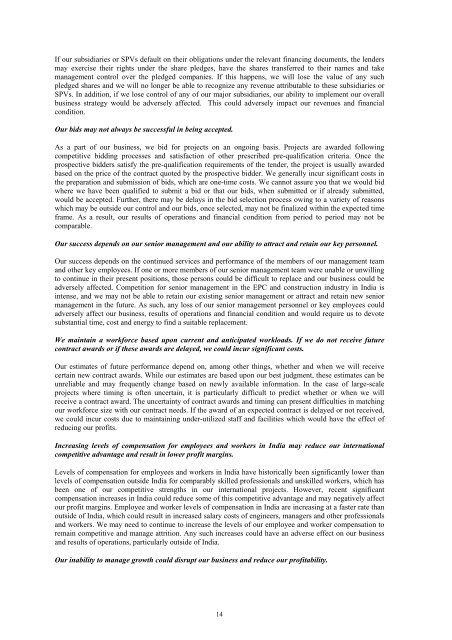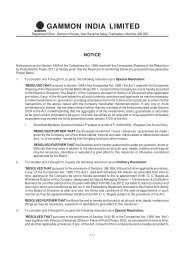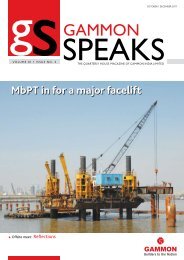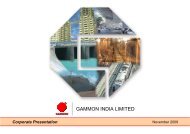GAMMON INDIA LIMITED
GAMMON INDIA LIMITED
GAMMON INDIA LIMITED
Create successful ePaper yourself
Turn your PDF publications into a flip-book with our unique Google optimized e-Paper software.
If our subsidiaries or SPVs default on their obligations under the relevant financing documents, the lenders<br />
may exercise their rights under the share pledges, have the shares transferred to their names and take<br />
management control over the pledged companies. If this happens, we will lose the value of any such<br />
pledged shares and we will no longer be able to recognize any revenue attributable to these subsidiaries or<br />
SPVs. In addition, if we lose control of any of our major subsidiaries, our ability to implement our overall<br />
business strategy would be adversely affected. This could adversely impact our revenues and financial<br />
condition.<br />
Our bids may not always be successful in being accepted.<br />
As a part of our business, we bid for projects on an ongoing basis. Projects are awarded following<br />
competitive bidding processes and satisfaction of other prescribed pre-qualification criteria. Once the<br />
prospective bidders satisfy the pre-qualification requirements of the tender, the project is usually awarded<br />
based on the price of the contract quoted by the prospective bidder. We generally incur significant costs in<br />
the preparation and submission of bids, which are one-time costs. We cannot assure you that we would bid<br />
where we have been qualified to submit a bid or that our bids, when submitted or if already submitted,<br />
would be accepted. Further, there may be delays in the bid selection process owing to a variety of reasons<br />
which may be outside our control and our bids, once selected, may not be finalized within the expected time<br />
frame. As a result, our results of operations and financial condition from period to period may not be<br />
comparable.<br />
Our success depends on our senior management and our ability to attract and retain our key personnel.<br />
Our success depends on the continued services and performance of the members of our management team<br />
and other key employees. If one or more members of our senior management team were unable or unwilling<br />
to continue in their present positions, those persons could be difficult to replace and our business could be<br />
adversely affected. Competition for senior management in the EPC and construction industry in India is<br />
intense, and we may not be able to retain our existing senior management or attract and retain new senior<br />
management in the future. As such, any loss of our senior management personnel or key employees could<br />
adversely affect our business, results of operations and financial condition and would require us to devote<br />
substantial time, cost and energy to find a suitable replacement.<br />
We maintain a workforce based upon current and anticipated workloads. If we do not receive future<br />
contract awards or if these awards are delayed, we could incur significant costs.<br />
Our estimates of future performance depend on, among other things, whether and when we will receive<br />
certain new contract awards. While our estimates are based upon our best judgment, these estimates can be<br />
unreliable and may frequently change based on newly available information. In the case of large-scale<br />
projects where timing is often uncertain, it is particularly difficult to predict whether or when we will<br />
receive a contract award. The uncertainty of contract awards and timing can present difficulties in matching<br />
our workforce size with our contract needs. If the award of an expected contract is delayed or not received,<br />
we could incur costs due to maintaining under-utilized staff and facilities which would have the effect of<br />
reducing our profits.<br />
Increasing levels of compensation for employees and workers in India may reduce our international<br />
competitive advantage and result in lower profit margins.<br />
Levels of compensation for employees and workers in India have historically been significantly lower than<br />
levels of compensation outside India for comparably skilled professionals and unskilled workers, which has<br />
been one of our competitive strengths in our international projects. However, recent significant<br />
compensation increases in India could reduce some of this competitive advantage and may negatively affect<br />
our profit margins. Employee and worker levels of compensation in India are increasing at a faster rate than<br />
outside of India, which could result in increased salary costs of engineers, managers and other professionals<br />
and workers. We may need to continue to increase the levels of our employee and worker compensation to<br />
remain competitive and manage attrition. Any such increases could have an adverse effect on our business<br />
and results of operations, particularly outside of India.<br />
Our inability to manage growth could disrupt our business and reduce our profitability.<br />
14
















